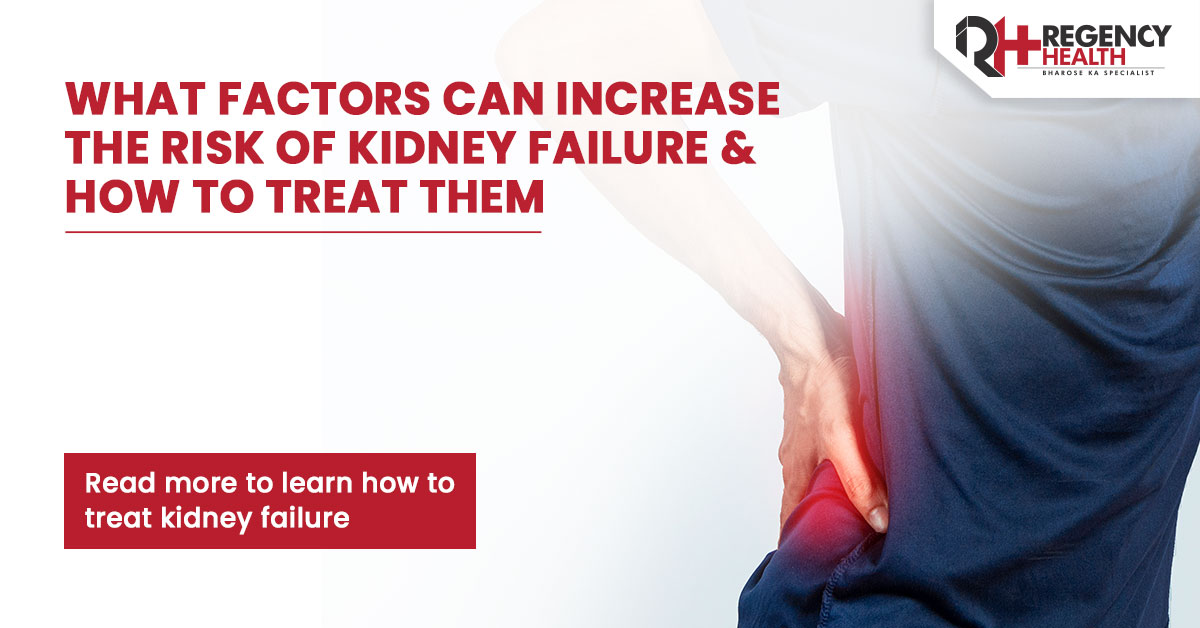
Kidneys are two bean-shaped organs about the size of fists. The kidney’s primary function is to filter blood, by removing wastes and extra fluids in the form of urine. They also aid in hormone production that regulates blood pressure and creates red blood cells. Apart from this, the kidneys also balance the levels of specific components in your blood (such as salt, potassium, and calcium).
What is kidney failure?
Kidneys occasionally lose their ability to filter and purify the blood. This may result in the accumulation of hazardous levels of waste which is also termed kidney failure.
Patients have “chronic renal disease” (CKD) before developing kidney failure. Kidney failure can be confirmed when kidneys’ (renal) function is compromised to the extent that kidney replacement is necessary. Several forms of dialysis or kidney transplantation can replace the kidneys. The phrase “kidney failure” refers to a wide range of issues such as:
- The kidney doesn’t receive enough blood
- The kidney is impacted by blood sugar, blood pressure, polycystic kidney disease
- Glomerulonephritis (damage to filters)
- Kidney stone development
Who does kidney failure affect?
Chronic kidney disease can strike anyone at any age. Yet, kidney disease might occur in certain persons at a higher rate than others. This condition may affect you if you:
- have high blood pressure with diabetes
- Family history of kidney diseases
- more aged
- belong to a demographic that has a high prevalence of diabetes or high blood pressure, such as American Indians, Asians, African Americans, and Hispanic Americans.
How common is kidney failure?
The high frequency of Chronic Kidney diseases (CKD) in India is caused by several factors. According to data from the United Nations Children’s Emergency Fund, 28% of babies weigh less than 2.5 kg. Pregnancy-related hypovitaminosis A and other dietary problems could result in newborns with lower kidney volumes. In addition to this, India is expected to be home to more than 30% of global diabetics by 2030. All these factors can lead to a common occurrence of chronic kidney diseases among the Indian population.
What is the main cause of kidney failure?
Chronic Kidney Diseases (CKD) are the first step towards complete kidney failure. Kidney function is permanently lost in CKD. The most frequent reasons include:
- blood pressure is high.
- long-lasting glomerulonephritis (kidney damage)
- elevated blood sugar (diabetes)
- renal polycystic disease
- obstructed urinary system
How is kidney failure diagnosed?
Kidney health is judged by the amount of filtration that takes place. The amount of blood that is filtered every minute (milliters/minute) is what is known as the “glomerular filtration rate,” which represents overall kidney function. Although it varies with age and sex, normal levels are around 100 ml/min. GFR can be calculated using formulas that consider your age, sex, and a blood test called creatinine or estimated GFR (eGFR).
When the creatinine level is high, it is a sign of diminished kidney function, renal failure is most frequently discovered. A higher level of creatinine in the blood indicates that the kidneys aren’t properly cleansing the blood. This test can detect a kidney problem even before the patient falls sick or feels unease.
How is kidney failure treated?
For AKI (Acute Kidney Injury) treatment, the underlying causes must be treated (such as high blood pressure, kidney stone, or high blood sugar). For a brief period, dialysis may be necessary.
Treatment of the underlying condition (such as high blood pressure and/or excessive blood sugar) can decrease the progression of CKD. The objective is to stop chronic kidney disease (CKD) from progressing to end-stage kidney disease.
This is where dialysis or a kidney transplant is typically required when kidney function drops below 10% of normal, especially if you exhibit symptoms of uremia (an accumulation of waste in the blood) along with nausea, loss of appetite, weight loss, and itching.

 Call-an-Ambulance
Call-an-Ambulance



